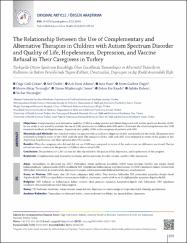The relationship between the use of complementary and alternative therapies in children with autism spectrum disorder and quality of life, hopelessness, depression, and vaccine refusal in their caregivers in turkey

Göster/
Erişim
info:eu-repo/semantics/openAccessTarih
2022Yazar
Gizli Çoban, ÖzgeÖnder, Arif
Sürer Adanır, Aslı
Kara, Aziz
Gürbüz Özgür, Börte
Aktaş Terzioğlu, Merve
Müjdecioğlu Demir, Gizem
Randa, Zehra Ece
Erdem, Aybike
Nasıroğlu, Serhat
Üst veri
Tüm öğe kaydını gösterÖzet
Objectives: Complementary and alternative medicine (CAM) is widely used for individuals diagnosed with autism spectrum disorder (ASD). In our study, it was aimed to evaluate the use of CAM treatments in children with ASD and to determine the relationship between the CAM treatment methods and hopelessness, depression, and quality of life in the caregivers of patients with ASD. Materials and Methods: One hundred-twenty six patients with a confirmed diagnosis of ASD was included in the study. All patients were evaluated in detail in terms of the CAM methods used. The caregivers of the child with ASD were evaluated in terms of the quality of life, depression, hopelessness, and their opinions about the vaccine. Results: When the caregivers who did and did not use CAM were compared in terms of the scale scores, no difference was found. Vaccine refusal was more common in the parents of children who received CAM. Conclusion: The preference of CAM use was not directly related to the quality of life, depression, and hopelessness of the caregiver.
Kaynak
Çocuk ve Gençlik Ruh Sağlığı DergisiCilt
29Sayı
2Bağlantı
https://dx.doi.org/10.4274/tjcamh.galenos.2021.29494https://hdl.handle.net/20.500.12933/1542















